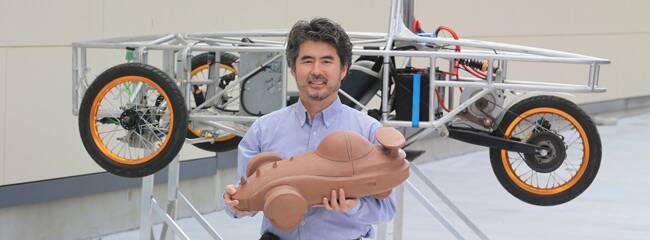That's the vision of Griffith University robotics researcher Dr Jun Jo who is about a year from completing the first self-driving car using a smartphone.
While car manufacturers such as Audi, BMW, Ford, Honda and Volvo have built expensive prototype "robotic" cars and Google has created an autonomous car that uses its navigation software, Dr Jo's system will be cheap and transportable to other cars.
"Ours is a vision-based system which is very economical," said Dr Jo who is president of the Australian Robotics Association. "When you get into a car, you will place your smartphone on the dashboard, facing the camera lens to the front.
"You can tell the smartphone where to go and make it automatically pay for the usage of the car when you get off." The system will use technologies which already exist in a variety of cars as cheap as the Ford Focus.
They include lane detection systems and a laser detection and ranging sensor to detect still or moving objects around the car. "We will make the control system safe and stable, using both a PC and a smartphone," Dr Jo said.
"Smartphones these days come with quad-core processors, which operate fast enough for vision analysis and car control. A PC runs the same program as well as the smarphone for safety backup, just in case the smartphone malfunctions."
Dr Jo said the system would allow drivers to personalise their driving experience by varying the settings on their phone. "My smartphone is like my secretary. No other device knows more about me," he said.
"It knows where I live and where I'm going to go and what's my favourite driving style, fast or comfortable." A recent US study found one in three drivers would be happy to use an autonomous car if it was safe.
"As our system detects objects, road lanes, the movement of other objects, in terms of speed and directions, it can give alerts to the driver or stop the car if urgent," Dr Jo said. "For example the car could drive very fast, 10cm apart at 110km/h and if any accident happens, all the cars would communicate to each other and reduce the speed properly and avoid big accidents.
"Also, if there is congestion it sends messages to other cars and they solve the traffic problem themselves. "In the future we won't need red, yellow and green traffic lights any more. When the cars meet at an intersection, they will communicate and say who will go first."
Dr Jo believes cars will become shared properties in the future, rather than personal belongings. "Today, we spend a lot to buy and maintain our cars," he said. "However most of the cars run less than 10 per cent of a day and are parked in garages or on streets for the rest of the time taking a large amount of unnecessary spaces.
"In the future, cars will be driven automatically and you call and catch a car, which is close to you. You will release it when you arrive at your destination. This idea would solve parking problems." He believes he and his team of eight researchers will have their electric prototype car ready for testing on public streets in a year.
The aluminium prototype car was built by Helensvale State High School teachers and students. An autonomous driving system would be commercially available in a decade, he said. "But first governments need to agree on a standard protocol for robot cars," he said.






.jpg)
.jpg)



.jpg)
.jpg)








Comments